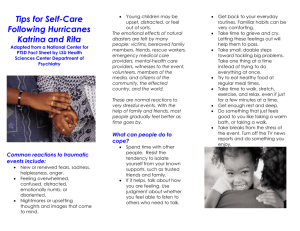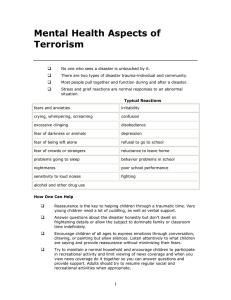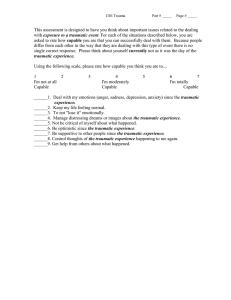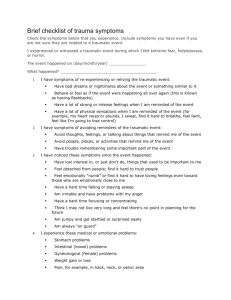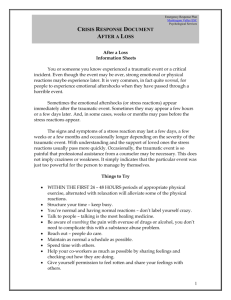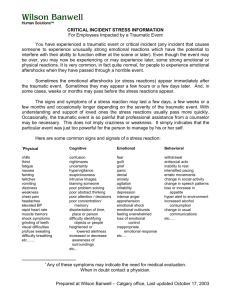The Long-term Impact of a Traumatic Event: What to
advertisement
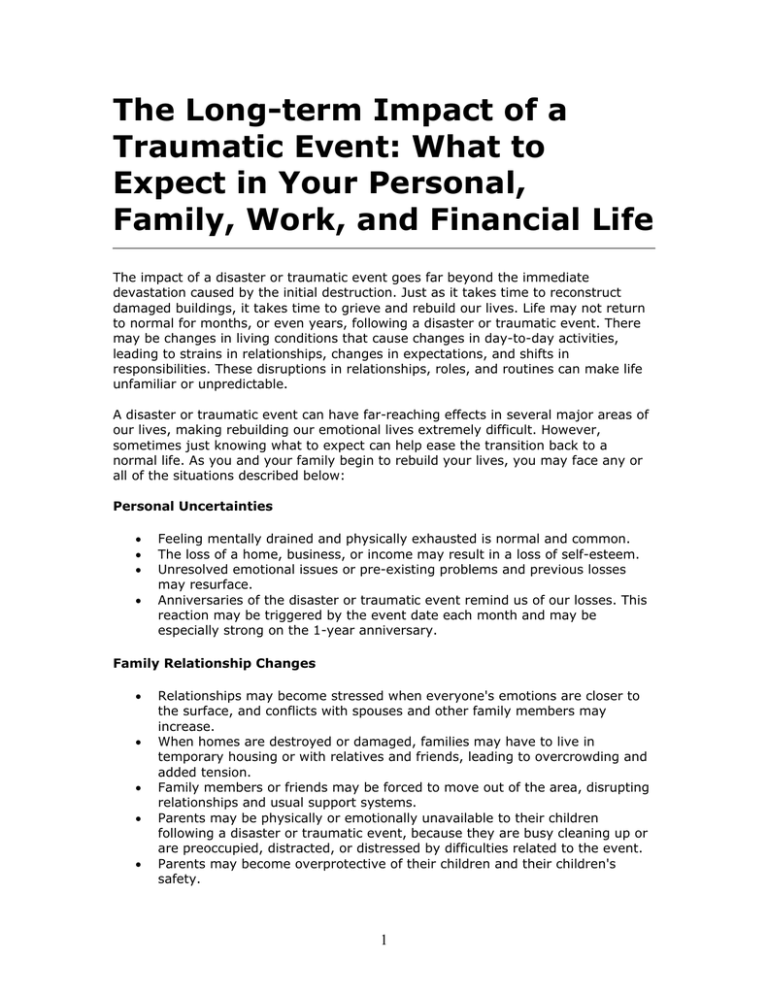
The Long-term Impact of a Traumatic Event: What to Expect in Your Personal, Family, Work, and Financial Life The impact of a disaster or traumatic event goes far beyond the immediate devastation caused by the initial destruction. Just as it takes time to reconstruct damaged buildings, it takes time to grieve and rebuild our lives. Life may not return to normal for months, or even years, following a disaster or traumatic event. There may be changes in living conditions that cause changes in day-to-day activities, leading to strains in relationships, changes in expectations, and shifts in responsibilities. These disruptions in relationships, roles, and routines can make life unfamiliar or unpredictable. A disaster or traumatic event can have far-reaching effects in several major areas of our lives, making rebuilding our emotional lives extremely difficult. However, sometimes just knowing what to expect can help ease the transition back to a normal life. As you and your family begin to rebuild your lives, you may face any or all of the situations described below: Personal Uncertainties • • • • Feeling mentally drained and physically exhausted is normal and common. The loss of a home, business, or income may result in a loss of self-esteem. Unresolved emotional issues or pre-existing problems and previous losses may resurface. Anniversaries of the disaster or traumatic event remind us of our losses. This reaction may be triggered by the event date each month and may be especially strong on the 1-year anniversary. Family Relationship Changes • • • • • Relationships may become stressed when everyone's emotions are closer to the surface, and conflicts with spouses and other family members may increase. When homes are destroyed or damaged, families may have to live in temporary housing or with relatives and friends, leading to overcrowding and added tension. Family members or friends may be forced to move out of the area, disrupting relationships and usual support systems. Parents may be physically or emotionally unavailable to their children following a disaster or traumatic event, because they are busy cleaning up or are preoccupied, distracted, or distressed by difficulties related to the event. Parents may become overprotective of their children and their children's safety. 1 • Children may be expected to take on more adult roles, such as watching siblings or helping with cleanup efforts, leaving less time to spend with friends or participate in routine activities, such as summer camp or field trips. Work Disruptions • • • • • Fatigue and increased stress from preoccupation with personal issues can lead to poor work performance. Conflicts with co-workers may increase, due to the added stress. Businesses may be forced to lay off employees, or company work hours and wages may be cut. Reduced income may require taking a second job. Daily travel and commute patterns are disrupted, due to the loss of a car or road reconstruction. Financial Worries • • Those who experience work disruptions may be unable to regain their previous standard of living, leading to financial concerns and unpaid bills. Seeking financial assistance to rebuild and repair damages adds to the already high levels of stress caused by the disaster or traumatic event, and the hassles of dealing with bureaucracy can add to the frustration. How to Be a Survivor Regardless of individual circumstances, everyone needs to complete several steps on the road to recovery from a disaster or traumatic event: • • • • • Accept the reality of the loss. Allow yourself and other family members to feel sadness and grief over what has happened. Adjust to a new environment. Acknowledge that the person or possessions lost are gone forever. Put closure to the situation and move on. Do not continue to let the loss take its physical, emotional, or spiritual toll. Have faith in better times to come. You and your family have survived a traumatic event. That doesn't mean your lives are over or that you don't deserve to be happy again. Return to doing things you enjoy with friends and as a family. Reestablish the routines of your life. Make commitments and keep them. If you or a member of your family still have trouble coping on your own, ask for help. Consult a counselor or mental health professional. In the workplace, you may be able to get assistance from your human resources department or your company's Employee Assistance Program. For help with financial matters, contact a financial advisor. NMH02-0139 10/02 2
